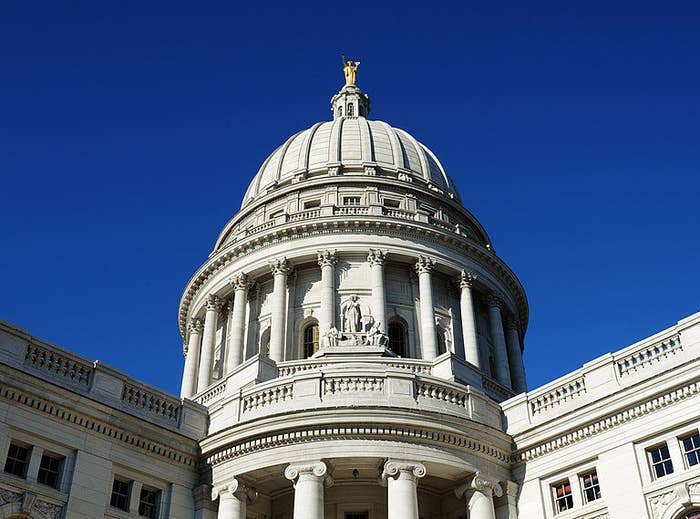Democrats had tried to postpone the primary election, citing low voter turnout and the potential to spread the virus.

Karen Bleier / Getty Images
The journalists at BuzzFeed News are proud to bring you trustworthy and relevant reporting about the coronavirus. To help keep this news free, become a member and sign up for our newsletter, Outbreak Today.
The US Supreme Court and Wisconsin Supreme Court ruled against Democrats in back-to-back decisions on Monday, declaring that key aspects of the state’s primary election must proceed as originally scheduled — issuing two separate orders that said late mail-in ballots cannot be counted and that in-person voting must proceed on Tuesday despite fears that people at polling sites will spread the coronavirus.
[ads id="ads1"]
Democrats had feared proceeding as planned would worsen the pandemic, while driving down voter turnout and sending hundreds of state-level elections into turmoil.
The nation’s top court ruled 5-4 along ideological lines in favor of Republicans, who sought to block a lower court decision that would have provided six extra days for election officials to receive absentee ballots in the mail.
Despite concerns that a backlog within the postal service meant thousands of mail-in ballots would be tossed out, the Supreme Court’s conservative majority found a lower court erred by extending the date for ballots to be accepted to April 13. Democrats had not initially requested that specific ruling, and writing for the majority, Justice Brett Kavanaugh said, the lower court’s order “fundamentally alters the nature of the election.”
“When a lower court intervenes and alters the election rules so close to the election date, our precedents indicate that this Court, as appropriate, should correct that error,” the opinion said. The majority added that modifying election rules ran afoul of the Purcell principle, a doctrine that courts should avoid meddling in elections immediately before the vote, saying doing so “judicially created confusion.”
Justice Ruth Bader Ginsberg, leading a dissent for the court’s liberal wing, took umbrage with the majority opinion that had declared the case was about a “narrow, technical question.”
The minority wrote wrote that Wisconsin voters “will have to brave the polls, endangering their own and others’ safety. Or they will lose their right to vote, through no fault of their own. That is a matter of utmost importance—to the constitutional rights of Wisconsin’s citizens, the integrity of the State’s election process, and in this most extraordinary time, the health of the Nation.”
About two hours beforehand, the Wisconsin Supreme Court declared that in-person voting in the swing state must proceed as planned despite the pandemic, blocking an executive order issued earlier the same day by Democratic Gov. Tony Evers that attempted to delay Tuesday’s scheduled primary election until June.
Republicans have insisted extending deadlines would undermine election integrity. In announcing their lawsuit, Republican leaders of the state legislature called the governor’s last-ditch effort to postpone the vote a “constitutional overreach” and said, “Evers can’t unilaterally run the state.”
Evers, who had previously said he lacked authority to delay the election, had issued his order Monday afternoon postponing in-person voting for the primary until June 9 and directing the legislature to convene on Tuesday afternoon. Wisconsin’s election was the last April primary that had not yet been delayed.
The state supreme court blocked the provision that suspended voting, but said the legislature could still convene on Tuesday.
Wisconsin Supreme Court justice Daniel Kelly — who was appointed by Republican former governor Scott Walker — tweeted on Monday afternoon before the decision that “we urge clerks, poll workers, and voters to stand ready to conduct the election” as scheduled on Tuesday. He abstained from the state court’s ruling.
At least 15 states have postponed primary voting dates due to the pandemic — and Evers and others Democrats pleaded to do the same in Wisconsin — but Republicans who control the state legislature balked.
[ads id="ads2"]
The GOP has long tried to suppress voter turnout, particularly by people of color in swing states; in the lawsuit about the absentee ballot filed last week, the Republican National Committee and Wisconsin Republicans called on courts to order Wisconsin’s primary to proceed as scheduled and block efforts to extend the timeline for counting ballots.
In a ruling that partially sided Democrats, however, US district court judge William Conley ruled on Thursday that ballots received by April 13 must be counted regardless of when they are postmarked — six days after the original deadline for officials to receive ballots — even though Democrats had not requested that sort of ruling. On Friday, the 7th Circuit Court of Appeals denied Republicans’ request to block that lower court decision.
The next day, Republicans filed an emergency application at the Supreme Court saying, “Requiring a state to permit unlimited absentee voting for almost a week after election day presents significant dangers to election integrity, voter confidence and the orderly administration of an election that already has strained state resources due to the difficult circumstances associated with COVID-19.”
The Democratic National Committee countered there had been a backlog of 21,590 requested mail-in ballots — driven by voters who wanted to vote absentee during the pandemic — as of April 2.
“It appears that tens of thousands of voters may not even receive their requested absentee ballots by election day,” said a response filed at the Supreme Court by Democratic election lawyer Marc Elias, who added, “Thousands of voters at minimum will be disenfranchised if their requested absentee ballots must be postmarked by Tuesday the 7th.”
The Democrats’ filing went on to argue that the Republican plan “could exacerbate the unfolding COVID-19 public health disaster. If voters are not confident their absentee ballots will be counted, this will drive more people to vote in-person on election day, thereby increasing the risks of community spread through polling places in cities and towns throughout Wisconsin.”

Enregistrer un commentaire